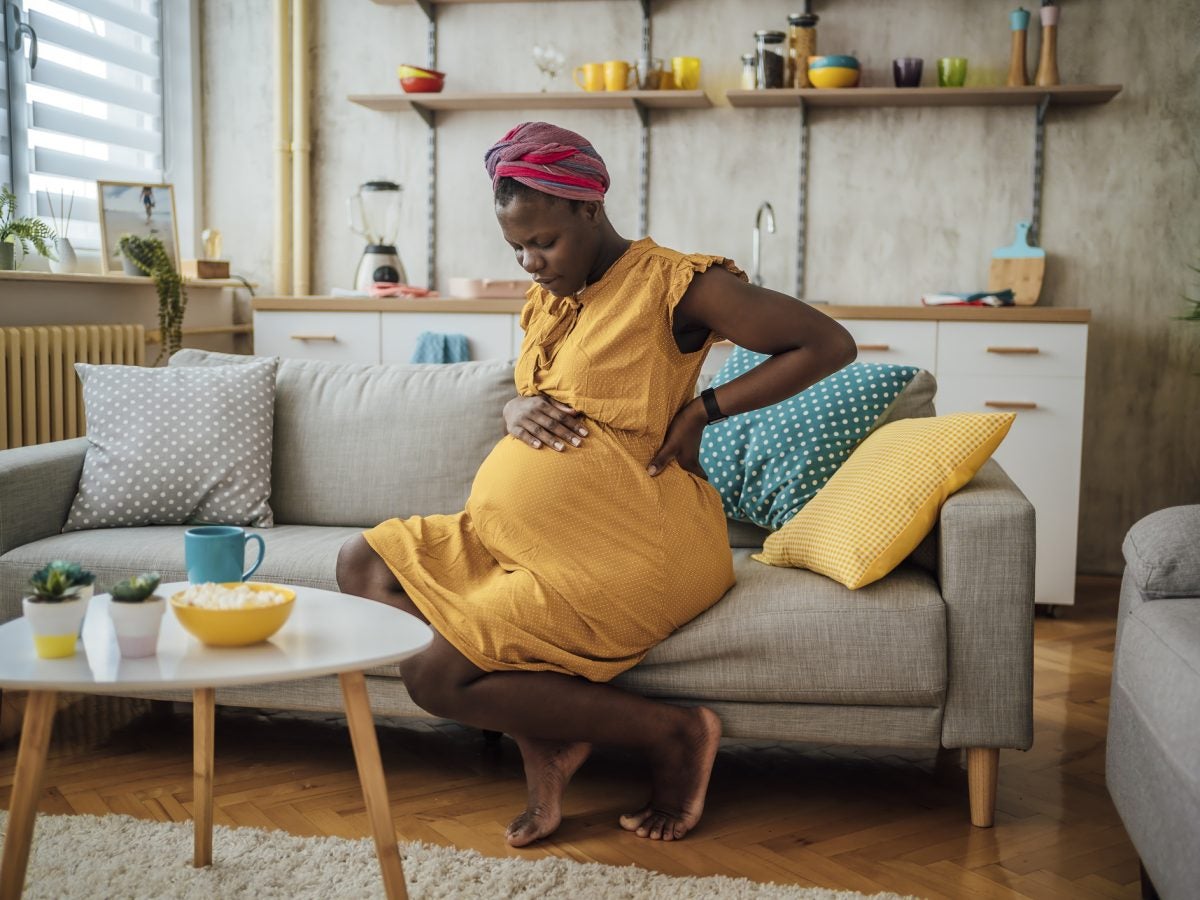
April 11-17 is Black Maternal Health Week. These stories regarding the health of women during pregnancy, childbirth, and the postpartum period are to commemorate the work being done to improve the birthing experiences of Black mothers in this country.
From the moment you find out you that you’re pregnant, you grapple with a wide range of feelings. There’s the happiness, perhaps some surprise if the news is unexpected, maybe even awe over the fact that you’ve been entrusted to bring forth life. As the months pass, more feelings flood in, especially as your child grows and you change with them. Possibly, at some point, fear becomes one of your many feelings, with you in the back of your mind as your due date draws near.
There may be fear due to the stories we hear, the news that is shared that shows that too many Black mothers are having difficult, sometimes deadly birthing experiences that are often preventable. Jessica Shepherd, MD, Ob-Gyn, and alumnus of Adtalem Global Education’s Ross University School of Medicine and chief medical officer at Verywell Health, has heard these concerns many a time.
“For many women, it’s fearful to think of pregnancy when there has been such a focus on the bad outcomes that have been seen nationwide,” she tells ESSENCE. “Many women express their fears and concerns even before getting pregnant. We know that there is an evident inequity in the healthcare system that needs to be addressed from all levels. When I see patients in the office and hear some concerns, I reassure them. Active participation from the provider, self-advocacy in decisions and plans as well as knowing the best ways to create healthy outcomes are the focus of the discussion.”
For Aiyana Davison, a midwife behind The Village House in Riverside, Calif. and known for her page @thevaginachronicles on Instagram, she works in both the community setting and in hospitals, so she often hears the concerns of women who don’t want to deliver in a medical center. They tend to be people who have had less than positive experiences giving birth in such institutions in the past.
“I would say there is a significant percentage of mainly Black and Brown folks who do express fears about birthing in the hospital. It may not always initially translate as fear-based but more so, a knowledge-based concern of the potential scenarios that can occur in a hospital setting,” she says. “Sometimes the concerns my patients express are questions like ‘Will you be at my birth?’ or other questions that suggest they are looking for safety and familiarity—our mutual trust.”
“I can recall quite a few people sharing their prior traumatic or poor birth and postpartum experiences and being vocal about it early and often in their care,” she adds. “Naturally, 2020 brought on more inquiry about community birth at home and birth centers for various, perhaps, fear-based reasons—virus exposure, visitor policies, support limitations including lack of in-person doula support, and limited information about the effects of the virus and subsequently vaccination.”
As mentioned by Davison, fears can often be tempered when a patient has a good relationship and level of trust with their provider. For some women, due to reasons involving insurance, location, and more, they can end up with Ob-Gyns they don’t feel comfortable with. When that occurs, both Shepherd and Davison say it’s important to speak up and know your options.
“If there are women who feel they are not comfortable with their provider, I do feel it is important to express to the provider what contributes to this,” says Shepherd. “Don’t be afraid to ask your doctor questions, especially if you feel something is wrong. Be sure to explain any underlying conditions you have, or new or persisting symptoms you may be feeling. If you feel unsatisfied or not comfortable after speaking with your doctor, there is no harm in seeking a second opinion elsewhere.”
Davison believes in having a loved one go with expectant mothers to ensure they’re being heard and concerns or questions are unabashedly voiced in situations likes these.
“I often encourage requesting to switch to a different provider. This alone can be problematic and comes from a place of privilege. Unfortunately, in our country, because of how insurance coverage works, where one lives, and other social determinants of health, some pregnant people may not be able to switch to another provider. They may not have easy access to the care that they are more than deserving of,” she says.
“In cases like this, there still needs to be options. I encourage utilizing an advocate during appointments. This could be a friend, family member, doula, or support person. They don’t have to be an expert. Just having someone with you who can help recall information later, prompt questions that may have been forgotten or weren’t previously thought about or asked, or call out providers who perhaps aren’t listening or answering questions and providing information at a level that the patient can understand. Many of us have been socialized to believe that what a provider says is best and a complete resolution. We need to unlearn some of this behavior. Medicine and healthcare is still a ‘practice’ and sometimes requires us to ask more questions, get a second opinion, find other solutions, and be open to possibilities for our health and healing including birth.”
As a midwife, Davison says her work and that of doulas can be of great assistance to moms-to-be, offering a team of support.
“Our expertise is in the low-risk or ‘normalcy’ of reproductive care. While midwifery is by no means perfect, I do believe that many midwives see their patients and clients as humans and as family units. We take the time to listen and also put together the pieces of what is happening to help in a way that best fits them,” she says. “I honestly don’t know that any particular provider can soothe or silence the fears of birthers especially as Black parents and pregnant people look around and see all that is going on in healthcare as well as the world we live in. These fears are valid. This is real. And we are not saviors. We offer help, navigation, and support and do our best to traverse the roads with our clients and stay the course with them however they need us to. I think we offer a trusted and safe space.”
She adds, “Likewise, doulas have an important supportive role. Their care, whether physical, mental, or spiritual truly aims to match the desires of the birther and family. Offering support in ways that fit our modern lives but also acknowledging our ancestral heritage. Midwives and doulas often add a level of cushion and comfort as well as advocacy that families need.”
For those who choose to forgo home births, which have increased in popularity lately, to stay in the hospital setting, Davison encourages moms to ask around, do their research and seek out support groups to get recommendations for hospitals and providers to go with. For Shepherd, she says there are things moms can do on their own to have a better experience in medical institutions and in turn, curb fears.
“To put your own health first, many steps can be taken to ensure a healthier outcome such as minimizing any health conditions during the pregnancy such as gestational diabetes and hypertension, prioritizing prenatal care, and asking questions that will create better dialogue with the provider and doctor. Making plans at each visit also ensures there are goals to every step of the journey,” she says.
“There are so many ways to enhance the personal experience when giving birth in a hospital too, such as certain hospitals that promote infant and mother care programs both in the antenatal period and post-partum period,” she adds.
During pregnancy and after, both women say it’s important to advocate for yourself, sharing your needs and concerns. “Use your voice when you know that there’s something that needs to be paid attention to,” Shepherd says. “You should feel that you have the best support from your provider and know all possible options on how to navigate pregnancy from an emotional, physical, and mental standpoint.”
“Make your desires and plans known. Sometimes in that discussion you may realize that you are more aligned with your provider than you thought or that it may be time to switch providers because of misalignment,” says Davison. “That’s ok! Even if you find a midwife or doula is not a match for you, if possible, seek out additional help. If there is something specific you desire for your pregnancy and birth don’t hesitate to ask early. This may impact how you proceed.”
As the news and statistics tell us that the birthing experiences of Black women are not where they should be in 2023, it’s important for expectant mothers to push for the outcomes they want and need. Birth plans can’t always be followed, but ensuring that you know what to expect and feel like you are on the same team with whomever is providing your care is absolutely necessary — and essential to doing away with fear during such an important time.
“Just as providers have specific tools to help them with their jobs, birthers and partners and families can have specific tools including knowledge to help them with this process. We need to know what is happening to our bodies, our babies, and our families,” says Davison. “It is important for people to know they do not have to journey alone. This is truly a community process—pregnancy, birth, postpartum, and parenting. Life itself is designed for us to have support.”






